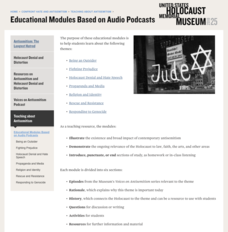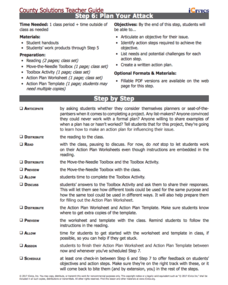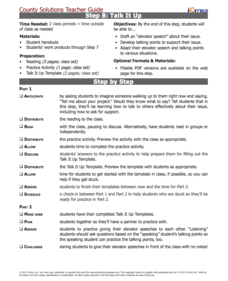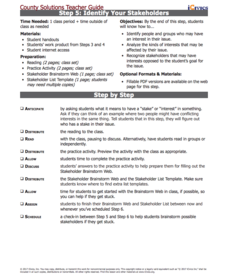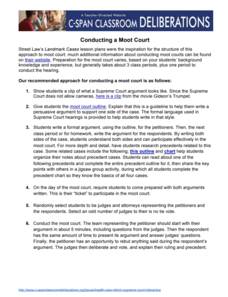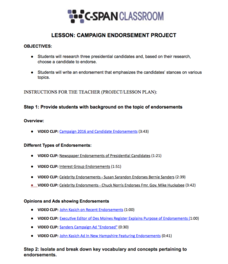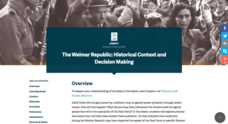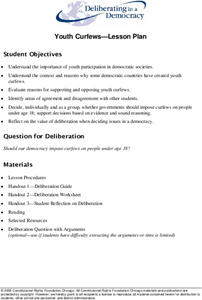US Holocaust Museum
Remember the Children: Daniel’s Story
Imagine being a child forced from your home and into a concentration camp during World War II. Scholars prepare for a visit to the United States Holocaust Museum by researching the children of the horrible event. They analyze...
US Holocaust Museum
Educational Modules Based on Audio Podcasts
Imagine hearing someone claim an event like the Holocaust never happened. Pupils use audio podcasts and reading passages to dive into the lives of those impacted by the Holocaust of World War II. Using the information they gather, class...
iCivics
Step 6: Plan Your Attack
Lights, camera, ACTION! Pupils learn what it takes to set up an action plan to achieve a goal in the sixth installment of a 10-part County Solutions - High School series. They research, analyze, and work together to create a plan of...
iCivics
Step 9: Grab People’s Attention
Attention! Attention! Scholars investigate the concept of attention-grabbers in advertising a product or a cause. They use the ninth installment of a 10-part County Solutions - High School series to analyze t-shirts, bumper stickers,...
iCivics
Step 8: Talk It Up
You have 30 seconds to sell your idea ... go! Scholars master the art of the elevator pitch in the eighth step of a 10-part series. They use research, practice, and step-by-step planning to gain a better understanding of the method....
iCivics
Step 7: Fill the Holes
It's time to communicate without using emojis or hashtags! In the seventh step of a 10-part County Solutions - High School unit scholars analyze professional communication when accomplishing a goal. They use examples, research, and data...
iCivics
Step 5: Identify Your Stakeholders
Have you ever had a goal, but needed help achieving it? Scholars analyze the purpose of stakeholders in the fifth installment of a 10-part County Solutions - High School series. They investigate finances, personal concerns, geography,...
iCivics
Step 4: Consider the Context
Have you ever noticed how deep the roots of a tree or plant stretch? Scholars analyze the context of an issue and the root causes that go to the base of the problem. The fourth step of a 10-part County Solutions - High School unit shares...
iCivics
Step 2: Find What You Need
Have you ever searched for something on the web only to get 50,000 results? Scholars analyze ways to break down an inquiry to get specific results. The second installment of a 10-part County Solutions - High School series researches...
iCivics
Step 1: Change the World?
Want to change the world? Where do you begin? Scholars analyze the steps that must take place to make change in society. The first installment of a 10-part County Solutions - High School series brings the real world to the forefront as...
Council for Economic Education
Banks and Credit Unions (Part 1)
Imagine you have money you want to save ... where do you put it? Pupils investigate the similarities and differences of banks and credit unions as they determine where exactly to place their hard-earned money. Through a WebQuest, they...
Council for Economic Education
Loan Amortization - Mortgage
When you buy a home for $100,000, you pay $100,000—right? On the list of important things for individuals to understand, the lesson presents the concept of interest rates and loan amortization using spreadsheets and online sources....
Council for Economic Education
Specialization and the Decathlon
Michael Phelps, the economist? Scholars research the economic advantages of specializing in one kind of service, and how it relates to athletes doing the same in their respective sports. They evaluate absolute advantage, production, and...
Council for Economic Education
Jokes, Quotations, and Cartoons in Economics
Humor offers a great tool teach the basics of economics to scholars via video clips, satire, and political cartoons. Individuals create their own economic humor to present to the class—with the assistance of Daryl Cagel's online...
Federal Reserve Bank
The Story of the Federal Reserve: High School Lesson Plan
Is there a bank for the banks? Pupils analyze the complexities of the Federal Reserve system by breaking it down into easy-to-understand sections. Step-by-step investigation using flow charts and graphs of how the monetary system works...
C-SPAN
Conducting a Moot Court
Review the conduct of different roles within the Supreme Court. A moot court activity educates learners about the roles of each member of the court and the process of a case with video clips, research activities, a graphic organizer,...
C-SPAN
Campaign Endorsement Project
So many politicians, so many endorsements! Learn to differentiate between facts as well as the process of endorsements with an informative resource. Class members watch current endorsement videos, research candidates from three different...
Deliberating in a Democracy
Marriage and the State
What defines marriage in society? Scholars investigate the moral and legal arguments of what defines marriage. They analyze different marriage traditions and social customs around the world along with Supreme Court decisions. Individuals...
Facing History and Ourselves
Laws and the National Community
When it comes to the law, is justice always served? Teach scholars about how law sometimes enables prejudice of entire groups of people with a unit on World War II that includes a warm-up activity, analysis of primary sources,...
Facing History and Ourselves
Do You Take the Oath?
Why did so many go along with Nazi policies during World War II? An investigatory unit includes four handouts, reading analyses, classroom discussion topics, and intriguing philosophical questions, helping learners understand the...
Facing History and Ourselves
The Weimar Republic: Historical Context and Decision Making
Did you know that way before Hitler became a dictator, he actually spent nine months in a German jail? Provide the background for the escalating point before the Nazi party took over in World War II through the exercises in the resource....
Facing History and Ourselves
Us and Them: Confronting Labels and Lies
Stereotyping and discrimination based on religion catalyze many atrocities in the world. Explain the awful treatment of Jews and the lies Nazis spread by using an informative yet sensitive resource. Learners participate in a warm-up and...
University of California
Principles vs. Practices
Have you ever wondered what your own World Order would look like? Scholars use primary and secondary documents as well as video clips to investigate and analyze the Cold War. Using the sources, the principles and practices of nations...
Deliberating in a Democracy
Youth Curfews
Don't stay out too late! Scholars analyze the need for youth curfews in a democratic society. They examine primary documents, case studies, and short video clips to form their opinions and take a position on the issue. Holding a class...



